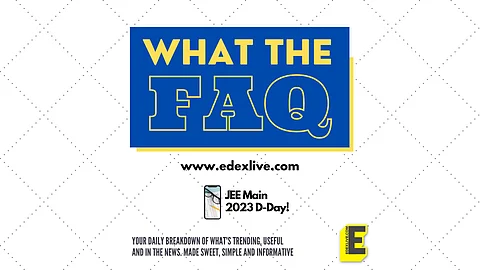

Protests and petitions have become a staple for national-level competitive exams such as the Joint Entrance Exam (JEE) and the National Eligibility-cum-Entrance Test (NEET). In December last year, when the National Testing Agency (NTA) announced that Session I of the JEE Main 2023 will be conducted in January, students found, to their chagrin, that they barely had 40 days to finish their preparations for the all-important test.
What followed was a couple of weeks of desperate attempts, including a petition in the Bombay High Court, to get the exam postponed. This, however, was to no avail. The exam went on as scheduled from January 24. Today, February 6, the NTA will announce the results of the exam on its official website. However, the students' tussle with the authorities over this exam is far from over. We take a look at some points of contention.
Why is JEE crucial?
The Joint Entrance Exam is a standardised test for entrance into undergraduate programmes in engineering, architecture and planning in prestigious institutions such as the Indian Institutes of Technology (IIT), National Institutes of Technology (NIT) and the Indian Institutes of Information Technology (IIIT), along with other colleges across the country. The exam was first instated in the year 2002 and was known as the All India Engineering Entrance Examination (AIEEE) until 2013. It was in 2019 that the test moved to the Computer-Based Testing mode. The exam is being conducted by the National Testing Agency since 2018. It is offered in 13 languages and is conducted in two papers.
How many students write it each year and what is the success rate?
The number of students taking the exam has seen a gradual decrease. This year, about eight lakh candidates appeared for the exam. While this is an improvement when compared to the numbers during the pandemic years, it is almost on par with the number of students who wrote Session I of the exam in 2019 (before the pandemic). Among the students who appear for the exam, the top 2,24,000 rankers will qualify for JEE Advanced, which is for admissions into IITs.
What issues has the exam faced in the years since the pandemic?
Before the pandemic struck India in 2020, Session I of the exam that year was conducted by the NTA in January. However, with the pandemic enforcing a lockdown in the country, the April session was postponed to September. Students filed a petition in the Supreme Court demanding further postponement of the exam, stating that their preparation had been affected by the pandemic. However, the top court dismissed the plea, stating that "life cannot be stopped" due to the pandemic and that the academic calendar was at stake.
In 2021, the exam was conducted in four sessions and the 75% eligibility criteria for admissions into NITs and IIITs were dropped in order to give students some relief. In 2022, the exam was rescheduled from April to June, with the second session happening in July. The counselling process for the exam concluded only in October and the NTA announced in December 2022 that Session I of JEE Main 2023 will be conducted in January.
What were the concerns that students raised after the notification for the exam for 2023?
The notification for the exam was released by the NTA just 40 days before Session I was set to begin on January 24. The students expressed concerns over the lack of time to prepare for the exam. The short notice impacted not just students who were going to give the exam for the first time, but also students who cleared their Class XII in 2021 and were sitting for the exam a second time.
Additionally, the NTA reinstated the 75% criteria for admission into NITs and IIITs, increasing the pressure on the droppers. Students also said that conducting the exam in January, with the second session set for April, would congest the academic year, with the batch of students joining in 2022 commencing their classes only late last year.
What avenues did they take to attempt to postpone the exam?
A petition was filed by advocate Anubha Shrivastava in the Bombay High Court, for a postponement of the exam and for the removal of the 75% criteria. Students also pursued campaigns on social media in an attempt to pressurise the authorities into postponing the exam. However, the Bombay High Court declined to reschedule the exam, which consequently commenced on January 24.
How can students check their results today?
The NTA has already released the final provisional key for the JEE Main 2023 Session I. Today, Feburary 6, the results of the exam are set to be declared on the official website. Here's how you can check your scores:
1. Go to jeemain.nta.nic.in
2. The link to the results, JEE Main Result 2023, should be live. Click on the link
3. Log in with your application number and date of birth
4. The JEE Main scorecard will be displayed. Check the details thoroughly
5. Download for further use
What next?
The Bombay High Court will hear the case against the 75% eligibility criteria on February 21. In addition to this, the students have now requested the court grant them an extra attempt to write the exam. This matter will also be taken up on February 21. Session II of the exam will commence on April 6.
